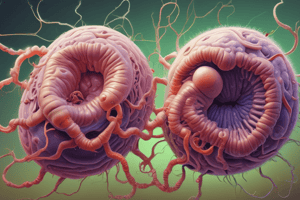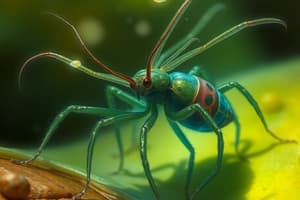Podcast
Questions and Answers
Endoparasite is the parasite that takes its abode inside the ______
Endoparasite is the parasite that takes its abode inside the ______
host
Ectoparasite is the parasite that takes its abode on the skin of the ______
Ectoparasite is the parasite that takes its abode on the skin of the ______
host
Obligatory Parasite must live on or within a host during all part of their lives and which die if prevented from doing so. It is the ______
Obligatory Parasite must live on or within a host during all part of their lives and which die if prevented from doing so. It is the ______
parasite
Facultative Parasite is able to live as an independent organism or as a parasite at its own ______
Facultative Parasite is able to live as an independent organism or as a parasite at its own ______
Pathogenic Parasite causes injury to the host by its mechanical, traumatic, and toxic ______
Pathogenic Parasite causes injury to the host by its mechanical, traumatic, and toxic ______
Spurious Parasite is the parasite of other animals which passes thru the human body without further development or without causing injury or ______
Spurious Parasite is the parasite of other animals which passes thru the human body without further development or without causing injury or ______
-
It is the parasite that takes its abode inside the host (infection).
-
Ectoparasite - it is the parasite that takes its abode on the skin of the host (Infestation).
-
Obligatory Parasite - It is the parasite that must live on or within a host during or all part of their lives and which die if prevented from doing so.
-
Facultative Parasite - It is the parasite that is able to live as an independent organism or as a parasite at its own will.
-
Pathogenic Parasite - It is the parasite that causes injury to the host by its mechanical, traumatic and toxic activities
-
Nonpathogenic Parasite - It is the parasite that does not cause injury to the host.
-
Spurious Parasite - It is the parasite of other animals which passes thru the human body without further development or without causing injury or damage.
-
Intermittent Parasite - It is the parasite which visits and leaves the host at intervals. It is also called temporary parasite.
-
Intermittent Parasite - It is the parasite which visits and leaves the host at intervals. It is also called temporary parasite.
-
Permanent Parasite - It is the parasite which lives its whole life from the time of hatching to death in a single host but in which the eggs or cysts are to be transferred to a new host before a second generation develops.
-
Periodic Parasite - It is the parasite in which its larval stage develops in a host different from that of the adult.
-
Transitory Parasite - It is the parasite which passes its larval period of development within the body of the host while the adult is free-living.
-
Incidental Parasite - It is the parasite which occurs occasionally in an unusual host.
-
Erratic Parasite - It is the parasite which becomes fixed in an organ or habitat which is ordinarily not its usual habitat.
14.Coprophilic Parasite - It is a protozoan organism which is able to live and often multiply in(moist fecal matter outside the body).
-
Hematozoic Parasite - It is the parasite living inside the red blood cells.
-
Cytozoic parasite - It is the parasite living inside the cells of tissues.
-
Coelozoic Parasite - It is the parasite living in body cavities.
-
It is the parasite that takes its abode inside the host (infection).
-
Ectoparasite - it is the parasite that takes its abode on the skin of the host (Infestation).
-
Obligatory Parasite - It is the parasite that must live on or within a host during or all part of their lives and which die if prevented from doing so.
-
Facultative Parasite - It is the parasite that is able to live as an independent organism or as a parasite at its own will.
-
Pathogenic Parasite - It is the parasite that causes injury to the host by its mechanical, traumatic and toxic activities
-
Nonpathogenic Parasite - It is the parasite that does not cause injury to the host.
-
Spurious Parasite - It is the parasite of other animals which passes thru the human body without further development or without causing injury or damage.
-
Intermittent Parasite - It is the parasite which visits and leaves the host at intervals. It is also called temporary parasite.
-
Intermittent Parasite - It is the parasite which visits and leaves the host at intervals. It is also called temporary parasite.
-
Permanent Parasite - It is the parasite which lives its whole life from the time of hatching to death in a single host but in which the eggs or cysts are to be transferred to a new host before a second generation develops.
-
Periodic Parasite - It is the parasite in which its larval stage develops in a host different from that of the adult.
-
Transitory Parasite - It is the parasite which passes its larval period of development within the body of the host while the adult is free-living.
-
Incidental Parasite - It is the parasite which occurs occasionally in an unusual host.
-
Erratic Parasite - It is the parasite which becomes fixed in an organ or habitat which is ordinarily not its usual habitat.
14.Coprophilic Parasite - It is a protozoan organism which is able to live and often multiply in(moist fecal matter outside the body).
-
Hematozoic Parasite - It is the parasite living inside the red blood cells.
-
Cytozoic parasite - It is the parasite living inside the cells of tissues.
-
Coelozoic Parasite - It is the parasite living in body cavities.
Flashcards are hidden until you start studying
Study Notes
Types of Parasites
- Endoparasite: lives inside the host
- Ectoparasite: lives on the skin of the host
- Obligatory Parasite: must live on or within a host during all parts of their lives and dies if prevented from doing so
- Facultative Parasite: able to live as an independent organism or as a parasite at its own will
Parasite Interactions with Host
- Pathogenic Parasite: causes injury to the host by its mechanical, traumatic, and toxic activities
- Nonpathogenic Parasite: does not cause injury to the host
- Spurious Parasite: passes through the human body without further development or causing injury or damage
Parasite Life Cycles
- Intermittent Parasite: visits and leaves the host at intervals, also called temporary parasite
- Permanent Parasite: lives its whole life from hatching to death in a single host, but eggs or cysts are transferred to a new host before a second generation develops
- Periodic Parasite: larval stage develops in a host different from that of the adult
- Transitory Parasite: passes its larval period of development within the body of the host, while the adult is free-living
Parasite Host Interactions
- Incidental Parasite: occurs occasionally in an unusual host
- Erratic Parasite: becomes fixed in an organ or habitat which is ordinarily not its usual habitat
Parasite Environments
- Coprophilic Parasite: lives and multiplies in moist fecal matter outside the body
- Hematozoic Parasite: lives inside red blood cells
- Cytozoic Parasite: lives inside cells of tissues
- Coelozoic Parasite: lives in body cavities
Studying That Suits You
Use AI to generate personalized quizzes and flashcards to suit your learning preferences.




